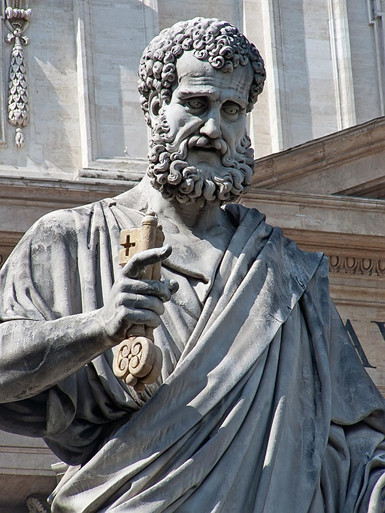There have been many great religious figures in history. Their followers in all the world’s major religions (Islam, Buddhism, Judaism, etc.) would count Jesus among the list of holy and great religious leaders. Even people who belong to no religion would say the same. So, there can be plenty of responses today to Jesus’s question, “Who do people say that the Son of Man is?” What's important for us, though, is that we have a clear idea of what our answer may be to that question.
At the heart of the Gospel message is the challenge to articulate who we believe Jesus to be and to lose ourselves in the concern for others. If we truly love every other person as Jesus has loved us, then we don't look at risk, or color, or public opinion, or all of the other excuses for walking away. This is easier said than done.
Pet er was the first disciple to acknowledge openly that Jesus was the promised Messiah. "Who do you say that I am?" he was asked. "So, what do you think?" But when Jesus puts his question to Peter he isn’t asking about public opinion. He is inviting a conversion of heart from his disciples, a confession of faith that results in a lifetime commitment and a changed life.
er was the first disciple to acknowledge openly that Jesus was the promised Messiah. "Who do you say that I am?" he was asked. "So, what do you think?" But when Jesus puts his question to Peter he isn’t asking about public opinion. He is inviting a conversion of heart from his disciples, a confession of faith that results in a lifetime commitment and a changed life.
"You are the Christ," Peter answered (Mt. 16:15-16). And then came Jesus' strange reply in which He strictly charged the disciples to tell no one that He is the Christ. Why? Why not spread the news as quickly as possible? Perhaps Peter and the others hadn't yet come to understand who the Messiah really was.
Peter was right about Jesus being a Messiah, “the Christ.” But what he did not get was the kind of Messiah Jesus would be, one who would not rise above our suffering but who would join us in it. Little by little and over time, Peter and the others come to realize that this Jesus, this Messiah, is very different from the one they were looking for.
"On this rock I will build my church." Matthew is the only evangelist to use this technical term, which derives from the Hebrew word qahal, or "assembly" of the people of Israel. Weak and frail as Peter is, even the forces of death will be powerless. This phrase in today's Gospel is testimony to the continuity of community and its life in Jesus. The community is distinctive because it truly understands who Jesus is.
We can begin to see how practical and contemporary this is. To one degree or another, we try to shape the Messiah according to our own preconceptions. We tailor His image to fit our own desires and our own concerns. We refuse to let Him come into our lives on His terms. We try to shape Him to fit our own images and prejudices.
But in order to truly understand Jesus it may be necessary to relinquish certain things we want to cling to - certain attitudes, or certain habits or certain ideas. It may be painful, even agonizing to do so. This is called conversion of heart. But until this conversion occurs no amount of faithful church attendance, no amount of theology and no amount of complacent religiosity will open the door to Jesus.
So, what then do we really think?
Thomas Merton once wrote that the only way in which we can at last understand who God is and enter into the possession of the reality of God (which lies at the very roots of our existence) is to stop talking about it, grasp the reality and lay our hands on it by just living it out in our daily lives.
Only then will we truly come to know who Jesus is, and who we really are.





